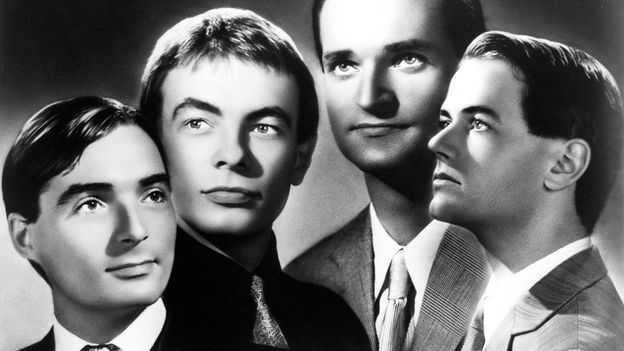Krautrock bands lived by this ethos: within the early Seventies, Can lived and recorded in a Fifteenth-century fort exterior Cologne; Faust spent the identical interval in a commune in Wümme, close to Hamburg. And so krautrock bands had been political by their actions slightly than by something express: on the one hand, they represented the idealistic imaginative and prescient of a brand new, various lifestyle, whereas the disregard for custom of their music steered the disruptive energy of protest and motion.
Can’s socialist-style philosophy confirmed a approach to construction society. “We have now by no means made political statements,” says Schmidt. “Aside from what we had been. We had been one organism. We had no hierarchy. And that may be a form of anarchy. However there may be not a single piece of music for us that has an writer besides Can”.
In Düsseldorf, Rother and his ultimate Neu! bandmate, drummer Klaus Dinger, was in an early three-piece incarnation of Kraftwerk with Florian Schneider, whereas Ralf Hutter had briefly left to check. Though this model of Kraftwerk by no means launched a document, Rother and Dinger fostered a proto-Neu! sound, as captured throughout a 1971 TV look. “I noticed the folks going loopy,” Rother says. “They had been excited. And in addition to, this was a youthful viewers. It was the beginning of one thing new for the viewers. That was clear.”
Rother and Dinger quickly left Kraftwerk to hitch Neu! to form. An evolving Kraftwerk would launch three never-to-be-reissued albums earlier than its run of traditional albums started with 1974’s Autobahn; they might transcend the krautrock style to turn out to be a groundbreaking digital act and top-of-the-line and most influential teams of all time.
The defining band of the period
However initially it was Neu! who broke new floor. In Dinger, Rother had discovered a kindred spirit (even when they didn’t at all times agree). “With out discussing or coming to an settlement, what we had in widespread was that we wished to be distinctive – a really humble method. And that made us transfer away from custom and embark on the trail of reinventing the wheel. I made a decision to cease “All of the clichés, the requirements. I threw all that overboard and tried to come back again to the only parts in music: one tone, one be aware, one chord, one rhythm.”
In his 1995 e book Krautrocksampler, musician and artist Julian Cope mentions Neu! “The epitome of krautrock, they outlined the time period extra clearly than every other group.” Their debut album Neu!, launched in 1972, stays a landmark in rock music, that includes the defining sound of Neu! – and even from krautrock: the groundbreaking motorik beat. The motorik actually means ‘motor talent’ and is a driving, regular, sustained, propulsive 4-4 beat, finest exemplified by sensible Dinger performances in early Neu! songs like Hallogallo and Negativland. With the assistance of visionary producer Conny Plank – Krautrock’s reply to Sam Phillips – it was impressed partly by Rother’s love of perpetual movement.
“I really like driving on the freeway. Not rushing, that is a very unsuitable picture, however I really like working ahead, whether or not that is on a surfboard in large waves or simply the sensation of a powerful ahead motion,” he says. It was additionally, surprisingly, partly impressed by his love of soccer, with the success of the West German soccer workforce being a facet of German tradition unaffected by the atrocities of conflict. “There’s a connection. As a result of I nonetheless just like the quick ahead fashion in soccer, after they simply rush and the ball goes ahead with top quality technical abilities, but additionally attempt to acquire territory by passing the ball to the purpose transfer.”

